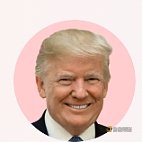Written by: Bulu
As the US presidential election approaches, the crypto digital asset industry is also hanging with a nervous heart - for "crypto assets", a hotly debated issue in the world, it is not only a governing issue with obvious differences between US President candidate Trump and the outgoing Biden administration, but also a focal issue of continued controversy during the current US presidential election.
Two views
As the two candidates who made it to the end of this US presidential election, Trump has a very clear view on the crypto digital asset industry, and attended the Bitcoin conference held in Nashville in July 2024, expressing his "support" in a high-profile manner. In contrast, Harris, another presidential candidate, has a relatively vague attitude towards the digital asset industry, but her attitude is relatively calm compared to the current Biden administration.

During the campaign, Trump's policy proposals on digital assets have a greater impact on public opinion:
Establish a national BTC reserve:Trump said that his administration will "retain all BTC currently held or acquired by the U.S. government in the future" and will become the "core of the national strategic BTC reserve." It is reported that as of October 2023, the U.S. government holds more than $5 billion in BTC, most of which comes from asset confiscations in criminal cases.
Establish a Digital Asset Advisory Committee:Trump proposed the establishment of an organization called the "Presidential Advisory Committee on Bitcoin and Crypto Assets," whose rules would be written by people who love the industry, not those who hate it.
Prevent the Federal Reserve from creating a central bank digital currency:It has become a trend for central banks in various countries to develop central bank digital currencies, but the Federal Reserve has not yet decided whether to create a fully digital dollar. Trump publicly opposed this idea many times in 2024. In May 2024, the U.S. House of Representatives passed a bill prohibiting the Federal Reserve from creating a digital dollar, but whether the bill can be finally passed as legislation still requires a long deliberation process.
Create an encryption platform World Liberty Financial:Aims to promote the widespread application of Stablecoins and decentralized finance. According to public reports, the early white paper of the project mentioned that a new digital asset called $WLFI would be launched and planned to be sold to the public.
Although Trump was skeptical of crypto assets three years ago and criticized crypto assets on social platforms for facilitating illegal activities, since August 2024, he has repositioned himself as a presidential candidate who firmly supports crypto assets.

Harris previously served as Vice President of the United States in the current Biden administration. The current US government has adopted a strong and strict regulatory attitude towards the encrypted digital asset industry.
So far, Harris has not made many remarks on the encrypted digital asset industry. On September 22, 2024, at a fundraising event in New York City, Harris first mentioned plans to "encourage innovative technologies such as artificial intelligence and digital assets."
At the same time, public media reports pointed out that Harris said at an event in Manhattan that she might take a more open stance on the crypto digital asset industry than the current government. However, Harris has not yet put forward a specific policy plan.
In addition, given the need to compete for potential voters in the campaign, the Democratic leaders behind Harris are working to improve relations with the crypto digital asset industry. And a digital asset advocacy organization called Crypto4Harris held a virtual town hall meeting that brought together several Democratic members.
Actions in the Crypto Market
According to data cited in public media reports, companies in the crypto digital asset industry, such as Coinbase and Ripple, have become the dominant corporate donors in the 2024 US presidential election,accounting for 48% of all corporate political donations in 2024, nearly half.
According to OpenSecrets, a nonprofit organization that tracks campaign spending, as of August 2024, the crypto digital asset industry has spent $119 million on political donations, which exceeds the scale of political donations from all other industries.
In this US presidential election, the crypto digital asset industry has long smelled an opportunity and hopes to use the election to elect government officials who support the crypto digital asset industry.
It is reported that since 2010, companies in the crypto digital asset industry have been actively participating in political elections. The depth, breadth and scale of their participation are second only to fossil fuel companies, making them the second largest industry actively participating in US political elections.
The survey data published in the recent report Election 2024 The Role of Crypto by GraysCale, the issuer of Ethereum spot ETF, reflects some of the market status of the US digital asset industry:
53% of the US voters surveyed have some knowledge of crypto assets. This data has increased compared to the survey in 2023.
Regulation still has an important role to play in boosting investor confidence in crypto assets - 80% of U.S. voters surveyed believe that regulators can play a role in managing emerging technologies, and 20% of voters surveyed said they would be more likely to hold crypto assets if there were clearer digital asset regulations or policies.
40% of U.S. voters surveyed said they were more concerned about the presidential candidates' positions on BTC or other crypto assets in this election than in previous elections.
Two-thirds of U.S. voters surveyed said they would consider the presidential candidates' positions on digital assets before voting. Among them, 56% of voters surveyed said they were more likely to vote for a presidential candidate who keeps an attitude of learning and understanding about digital assets than those who don't care.
Opposition
Polymarket, a social event prediction betting website, shows that in early October 2024, Donald Trump and Kamala Harris's approval ratings were tied at nearly 50%, but from late October 2024, Trump's approval rating suddenly rose, reaching 65.5% as of October 31, 2024, and became the focus of election discussions for a while.
Experts responsible for studying the election publicly stated that this situation may come from the enthusiasm of a small number of speculators in the crypto digital asset industry, trying to build momentum for Trump.
Although the influence of the crypto digital asset industry in political games seems to be increasing, opposition to crypto digital assets in the United States has never stopped.
In an interview with the media, Gary Gensler, chairman of the U.S. Securities and Exchange Commission, said that the crypto-digital asset industry is "full of fraudsters and speculators." He pointed out: "Crypto assets are only a small part of the U.S. and global capital markets, but they may undermine the trust of ordinary investors in the capital markets... Global investors have lost too much money because companies in the crypto-digital asset industry have not followed regulatory requirements."
Crypto-friendliness now does not mean crypto-friendliness in five years
Driven by hundreds of millions of dollars in election funds, crypto-digital assets have become an important factor in the 2024 U.S. election, affecting not only presidential candidates but also a large number of voters.
Trump attracted crypto-digital asset supporters through public and positive commitments, while Harris and the Democratic Party are struggling to follow up and are unwilling to give up the strong election cash flow that can be obtained by supporting this industry. Supporters in the field of crypto-digital assets are trying to exchange more favorable regulatory policies for the future development of the industry by supporting the election.

But amid the noise, the blog post once written by Ethereum founder Vitalik Buterin is always worth revisiting. He expressed the following views on the relationship between crypto digital assets and politics:
If you see a politician who is friendly to crypto assets, one thing you can do is to check their views on crypto assets themselves 5 years ago.
At the same time, you can also look up their views on topics related to the crypto industry 5 years ago. In particular, try to find topics that are inconsistent with "supporting freedom" and "supporting companies."
If a politician supports crypto assets, the key question to ask is: Do they have the right reasons to do so? Do they have the same vision as you for the development of technology, politics, and economics in the 21st century? Do they have a positive long-term vision beyond their immediate concerns of “beating down other bad tribes”?
If they do, great: you should support them and make it clear that this is why you support them. If not, then either stay out of it completely or find a better force to ally with.
At the same time, Vitalik Buterin explicitly opposes the trend of choosing political allegiance based on who “supports crypto”, and believes that this way of making decisions is highly risky and may go against your original intention and values of entering the crypto asset field.
As the US presidential election day on November 5, 2024 approaches, the battle between the two parties' presidential candidates is becoming more and more fierce. As for the future of encrypted digital assets, as Vitalik Buterin has always expressed: The future of digital assets should be related to "decentralization", "encryption" is not only about digital assets and blockchain - we need to support more than just "encryption", but also support deeper goals.
 Alex
Alex
 Alex
Alex Joy
Joy Brian
Brian Miyuki
Miyuki Brian
Brian Weatherly
Weatherly Anais
Anais Brian
Brian Alex
Alex Brian
Brian